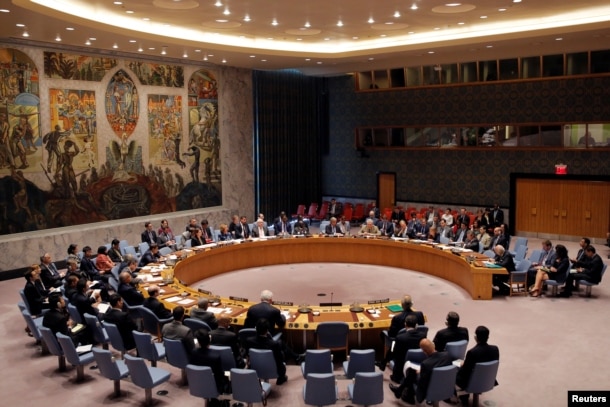
Race for Next UN Chief Enters Decisive Phase
UNITED NATIONS —
The race for the next U.N. Secretary-General enters a decisive phase on Wednesday, as the U.N. Security Council moves to the next level of voting.
The 15-member council is tasked with recommending a candidate for endorsement by the 193-member General Assembly.
Since late July, the council has held five rounds of “straw polls” – informal and anonymous balloting to gauge members’ enthusiasm about the 10 candidates.
In all five rounds, Portugal’s former Prime Minister Antonio Guterres, 67, has been the front runner. But his victory is by no means assured, although Wednesday’s vote will be a strong indicator of whether he can succeed.
The council will use color-coded ballots: one color for the five permanent, veto-wielding council members and another color for the 10 elected members.
Votes will no longer be equal. A “discourage” vote from Britain, China, France, Russia or the United States could effectively end the aspirations of individual candidates.

FILE – The United Nations Security Council holds a high level meeting on Syria at the United Nations in Manhattan, New York, U.S.
While the vote may not point to a clear winner immediately, candidates with one or more vetoes would likely start withdrawing their bids.
When there is a clear indication of a consensus candidate, the council would move to a formal vote.
“I had the feeling that the members of the council are leaning towards moving to a formal vote,” council president for October Russian Ambassador Vitaly Churkin told reporters Monday.
“I think there is a good chance that a few days after that [Wednesday’s straw poll] we will go to a formal vote and then things will become clear,” he said.
Late entrant
In a potential last minute shake up, Bulgarian Kristalina Georgieva, 63, entered the race on Thursday.
“I hope people will judge me on the merits of my candidacy, not on the duration of my campaign,” Georgieva told reporters Monday after meeting with member states. On Tuesday she was scheduled to meet with Security Council members.
The European Union Commission official was long rumored to be entering the contest, but ran into difficulties because her government had already committed its support to UNESCO chief Irina Bokova, also a Bulgarian.
Bokova began the straw polls with a strong third place showing, but she fizzled in subsequent rounds.
After a disappointing fifth place showing in the most recent poll, and only six of the 15 council members encouraging her candidacy, Bulgaria withdrew its support for Bokova and threw it behind Georgieva.
Despite not having her government’s backing, the council said Bokova could remain in the running, and she has said on social media that she is “fully committed to continue the race”.
At the U.N., there is a tradition of regional rotation to fill the secretary-general’s post. Eastern Europe is the only region that has never had a turn and it has fielded a number of candidates this year in a bid to end that.
There is also a push by about a third of the member states to see a woman for the first time occupy the secretary-general’s suite on the 38th floor of U.N. headquarters.
But despite the talk of wanting a woman, the female candidates have mostly placed only in the middle to the bottom of the pack. On Wednesday, Georgieva will try to break through into the top.
Once the council has arrived at a final name, it will vote in private formalizing its recommendation in a resolution. The resolution will be sent to the 193-member General Assembly where the body is anticipated to rubber stamp the council’s choice.
The winner will take over from Ban Ki-moon on January 1, 2017.

